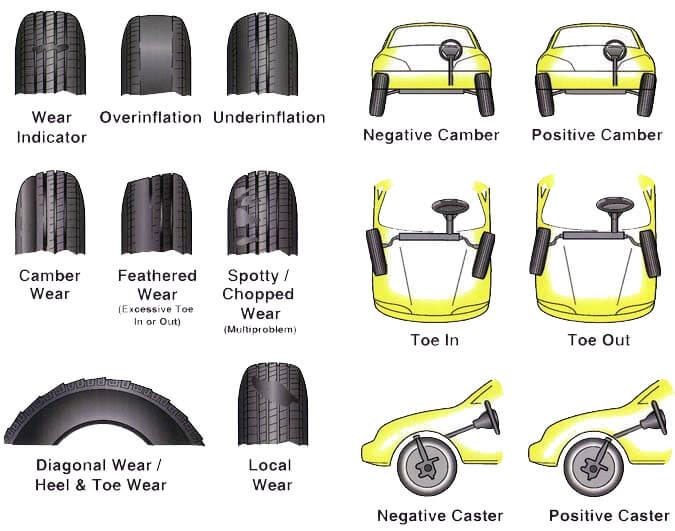Question posted by Jim T. regarding tire rotations on his 2005 Toyota
“Just curious, I noticed I am doing a tire rotation every 5,000 miles. What is the benefit of this?
Thanks for the question Jim. Let me explain…
First of all, what is a tire rotation?
Rotating tires means moving them from one wheel location to another — from left to right or back to front, or even diagonally. At A+ Japanese Auto Repair when we perform a tire rotation we will rotate your tires from back to front. We have noticed when we rotate tires in any other manner some vehicles will start to pull to one side or the other. When we rotate back to front we eliminate this the majority of the time.
What common items are diagnosed by tire wear?
Here is a tire wear chart showing most of the common items we look for when inspecting tires during a tire rotation: 
Why should I rotate my tires?
The front tires tend to wear on the outside and inside edges because the tire leans over when you steer to the left or right around corners. Also, turning the tires while stopped or at slow speeds (think pulling in and out of a parking spot) wears rubber of the tires. The asphalt acts like a tire cheese grater! So what do the rear tires do? The rear tires just follow the fronts, so they usually wear more evenly. So to sum it up, tires on the front of the vehicle wear much faster than the rear. When a tire rotation is performed at a regular interval we are balancing out the wear prolonging your tires life by thousands of miles in most cases.
Another way to look at this is… If we did not perform tire rotations on a vehicle we would likely replace the front tires 2-3 times before the rears needed replacement.
Can anything else affect my tires lifespan?
Yes, unbalanced tires, alignment issues, incorrectly inflated tires, and worn steering or suspension components can all affect tire life drastically!
Lets sum it up…
There are 3 key things that should happen during a tire rotation:
- Each tire and wheel is removed from your car or truck, and moved to a different position.
- Your tires air pressure will be checked and corrected as needed.
- Brakes should be checked while the tires are off and it's easy to see and reach them.
Jim, thank you for the great question. Let us know if your question has been answered. As always feel free to stop by A+ Japanese Auto Repair and have one of our auto repair professionals give you a hands on demonstration. Alternatively, feel free to visit our tire page for more in-depth information: A+ Japanese Auto Repair - Alignment and Tire Experts
Adam S.

A+ Japanese Auto Repair Inc.
--
Disclaimer: This article is provided for general informational purposes only. It is not intended as advice for your particular vehicle, and should not be relied upon for that purpose. Please consult a qualified automotive maintenance professional to determine the maintenance and repair needs for your vehicle.